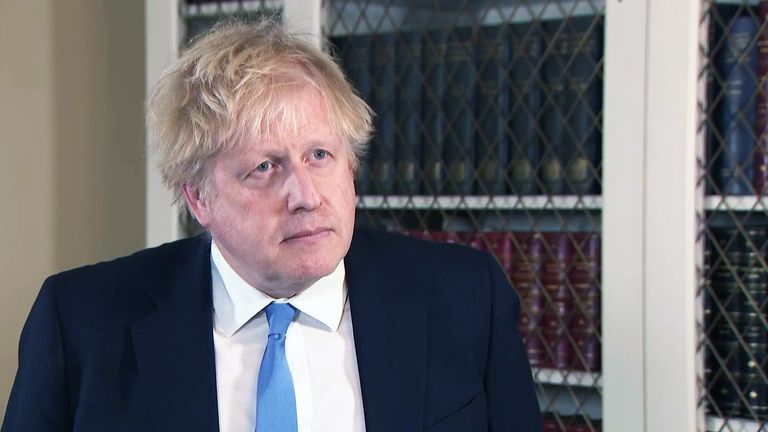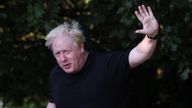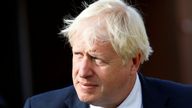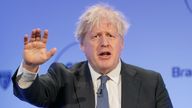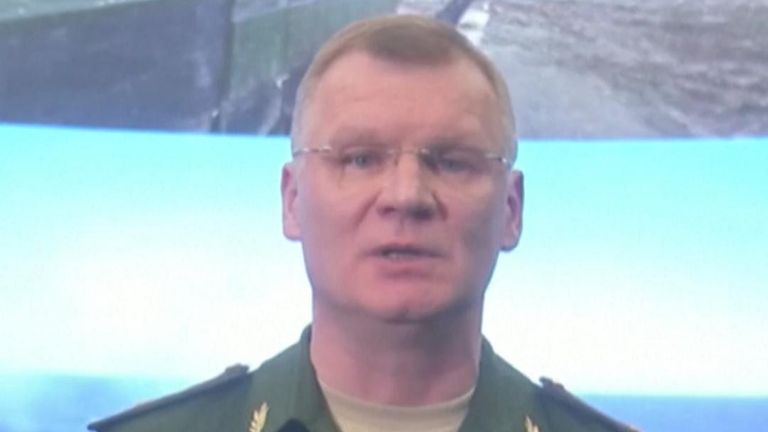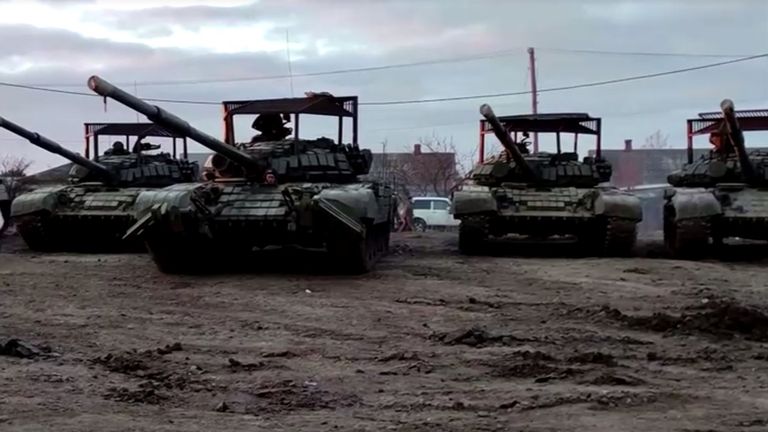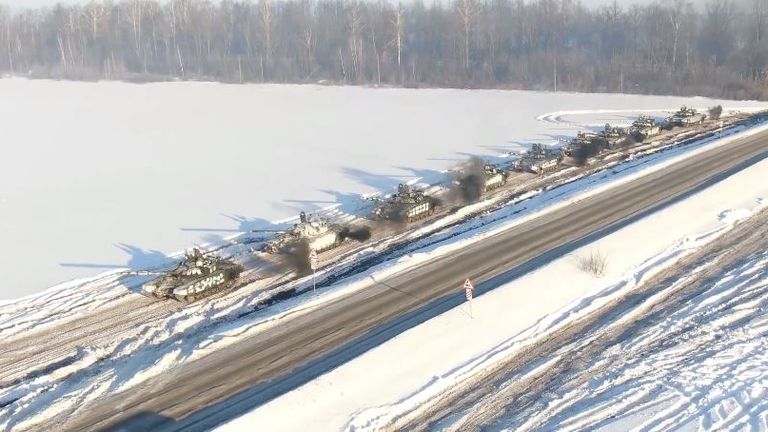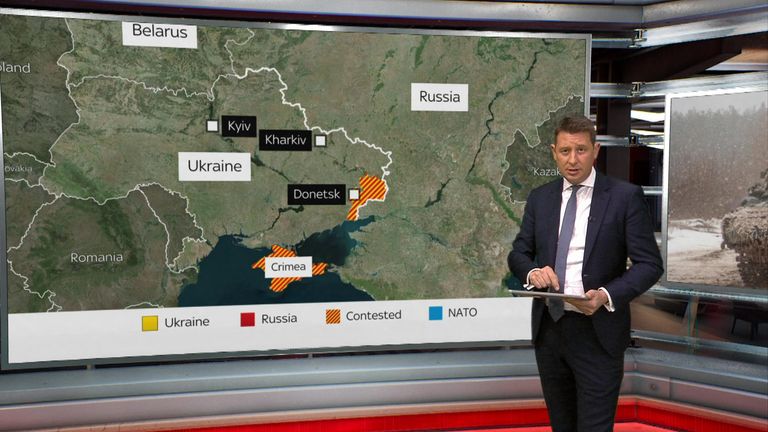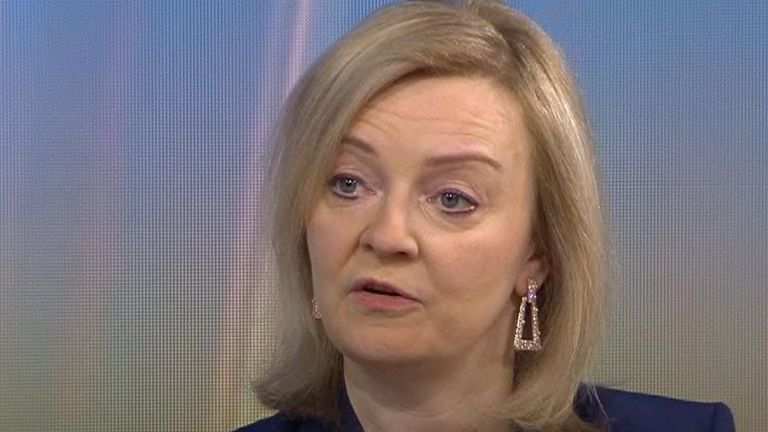Russia-Ukraine crisis: Boris Johnson says Russia sending 'mixed signals' as Moscow says West 'humiliated' over Ukraine invasion warnings
Western leaders are still warning Russia could invade Ukraine but Moscow claims it has just been training troops near the border and some are now leaving.
Tuesday 15 February 2022 16:03, UK
Boris Johnson said Russia is sending "mixed signals" as it appears to be preparing to invade Ukraine - but Moscow said some military units are returning to their bases and the West has been "humiliated" over its warnings about an incursion.
The prime minister said Russia is constructing field hospitals near the border with Ukraine and more battalion tactical groups are being brought closer to the border "which can only be construed as preparation for an invasion".
"So, mixed signals we're seeing at the moment and all the more reason for us to remain very tough and united, particularly on economic sanctions," Mr Johnson said.
He said a "programme of de-escalation" needs to be seen, meaning a withdrawal of the battalion groups, stopping field hospital construction and "a sense that things are being scaled back, a sense that the threat is over and the conversation and negotiation is beginning".
Speaking after a COBRA emergency committee meeting, Mr Johnson added: "We think there is an avenue for diplomacy and we've seen some positive signs from conversations between Mr Ushakov (Vladimir Putin's foreign policy adviser) and his American counterpart, from [Russian foreign minister] Sergei Lavrov and others.
"If that's correct then let's build on it."
Follow live updates on the Russia-Ukraine crisis
Some Russian troops 'return to base'
Earlier on Tuesday, the Russian Military of Defence (MoD) said it had been carrying out planned training exercises, including with Belarus, but some of those have been completed so a number of troops on Ukraine's border have begun heading back to their bases today.
However, it said the majority are still carrying out training both on land and sea, with more than 20 Russian ships starting drills in the Barents Sea on Tuesday.
Major General Igor Konashenkov, chief spokesman for the Russian MoD, said: "As the combat training measures are completed, the troops, as always, will return to their points of permanent deployment.
"The units of the southern and western military districts, having completed their tasks, have already begun loading onto rail and road transport and will begin moving to their military garrisons today.
"Separate units will return on their own as part of military columns."
West 'humiliated' by Russia
The US and the UK warned a Russian invasion of Ukraine was "imminent", likely on Wednesday, as more than 130,000 Russian troops amassed at the border. Russia has called on NATO to not allow Ukraine or any former Soviet country into NATO - something the Ukrainians have wanted for years.
Reflecting on Moscow saying some units are returning to their bases, Russian foreign ministry spokeswoman Maria Zakharova said: "15 February, 2022, will go down in history as the day Western war propaganda failed.
"Humiliated and destroyed without a single shot fired."
More: Russian invasion of Ukraine would be 'very dangerous moment' for world, Liz Truss warns
But speaking earlier on Tuesday, British Foreign Secretary Liz Truss told Sky News: "The only thing I'll believe is when they move the troops away from the border, words are easy. What they need to do is move the troops away from the border."
She added that the West would need to see a "full-scale removal of troops to show that is true", after being asked on LBC about Russia saying it had started returning units to their bases.
And Jens Stoltenberg, secretary-general of NATO, said so far, they are not seeing any reduced Russian military presence on the border.
He added that even if Moscow removes its troops, they often leave material behind that makes it easy for them to regroup quickly.
"We would have to see a substantial withdrawal of Russian troops and equipment for real de-escalation," he said.
Russia wants to continue dialogue with West
After Russia announced some of its troops were returning to their bases, Russian foreign minister Sergei Lavrov said Moscow will continue its dialogue with the West on security issues and is ready for separate talks on intermediate-range nuclear missiles.
He dismissed reports Russia is planning to invade Ukraine as "information terrorism", following talks with Polish foreign minister Zbigniew Rau in Moscow.
Mr Rau, also chairman of the Organisation for Security and Cooperation in Europe (OSCE), said the talks made him believe the gap between the West and Russia "has a chance to be narrowed".
Mr Stoltenberg added that NATO believes there is "some room for cautious optimism" but the alliance is still waiting for a Russian response to its security proposals and hopes to receive it soon.
Russia 'does not want war in Europe'
German Chancellor Olaf Scholz held a meeting with Russian President Vladimir Putin on Tuesday at the Kremlin as part of the latest Western diplomatic mission to seek de-escalation.
At a news conference with Mr Putin after the talks, Mr Scholz welcomed some troops withdrawing, adding: "We hope more will follow.
"It should be possible to find a solution. No matter how difficult and serious the situation seems to be, I refuse to say it is hopeless."
Mr Putin said Russia does "not want war in Europe" and it will act "according to how the situation develops, but we want to agree with partners".
He added that Russia wants to "solve the issue" of Ukraine's possible NATO membership "now".
Ahead of the meeting, Mr Putin told Mr Scholz Russian-German energy cooperation is a priority for Moscow, which views Berlin as one of its main partners.
Other Western allies have warned Germany must halt use of the newly finished Nord Stream 2 pipeline which will carry gas from Russia to Germany but is yet to be started up.
Mr Scholz told the news conference he is committed to making sure gas transit in Europe works through Ukraine, Belarus, Poland and Nord Stream 1, which is already up and running. He added that there would be consequences if a Ukraine invasion happened, when asked about Nord Stream 2.
Follow the Daily podcast on Apple Podcasts, Google Podcasts, Spotify, Spreaker
Last month, Mr Scholz signalled that "everything will have to be discussed should there be a military intervention" when asked about the pipeline.
However, he has stopped short of vowing to end Nord Stream 2's usage and has not named it in connection with sanctions. US President Joe Biden last week said the pipeline would be halted if Russia invaded.


